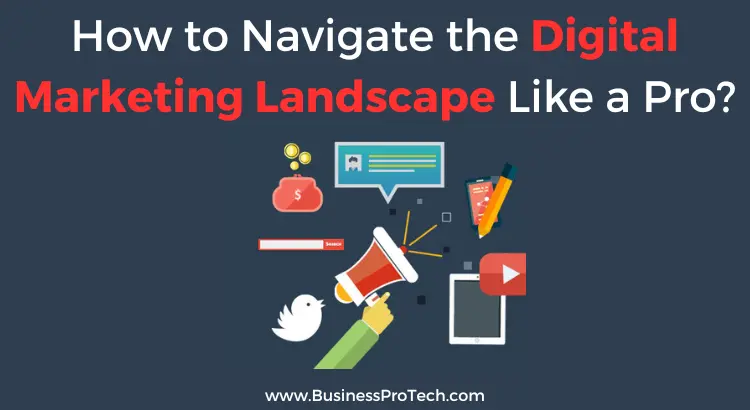The marketing landscape has evolved dramatically toward digital platforms. As a result, to remain relevant and competitive, businesses must have a digital marketing plan. Even seasoned marketers can find it challenging to navigate the digital marketing world. That is why it is critical to understand how to navigate this environment like an expert.
This article will provide the tactics and strategies you need to establish a successful digital marketing plan, from understanding the fundamentals of digital marketing to using social media and search engine optimization. You can get professional help from a Digital Agency to get started immediately!

Why Navigating the Digital Marketing Landscape is Vital?
Businesses and marketers must be able to navigate the digital marketing environment. With most customers spending their time online, companies must have a solid digital marketing plan to reach and interact with their target audience successfully.
Furthermore, the digital marketing environment constantly changes, with new platforms, tools, and technology appearing regularly.
Businesses can remain competitive and respond to changes in customer behavior and tastes by remaining up to speed with the newest trends and strategies in digital marketing.
Furthermore, good digital marketing can enhance brand exposure, consumer loyalty, and, eventually, conversion rates and income.
Businesses can reach their target audience with the correct message at the right time and place and accomplish their marketing objectives by navigating the digital marketing environment like an expert.
6 Ways for Navigating the Digital Marketing Landscape Successfully
Look at the following methods to help guide the digital marketing landscape like a pro:

Understanding the basics of digital marketing
Before delving into techniques, it’s critical to grasp the fundamentals of digital marketing. They include understanding the many channels available, such as social media, email marketing, search engine optimization, and various forms of digital content, such as blogs, videos, and infographics.
For example, a company that wishes to boost its online presence can start by building a website and a Facebook or Instagram account.
Moreover, accessing reliable digital marketing and social media resources becomes essential when harnessing these fundamentals effectively. These resources provide valuable insights, updated strategies, and expert advice, helping you stay at the forefront of the ever-evolving digital landscape.
Conducting market research and defining the target audience
Market research is essential for establishing a successful digital marketing plan. To produce content and campaigns that connect with their target audience, businesses must first understand their preferences, habits, and pain areas.
For example, a business offering baby items can perform market research to determine what information new parents want, such as infant care, nutrition, or sleep training suggestions.
Leveraging social media platforms

Social media sites like Facebook, Twitter, and Instagram can help companies reach and interact with their target audience. Businesses can use social media to increase brand recognition, form a community around their brand, and generate visitors to their website.
To engage its audience, a fashion business, for example, can use Instagram to present its current collection, cooperate with influencers, and host a social media contest.
Utilizing Search Engine Optimization (SEO)
Search engine optimization (SEO) improves a website’s content to appear higher on search engine results pages (SERPs).
Businesses can boost their online exposure and traffic by increasing the SEO of their website. This involves optimizing website content with relevant keywords, improving website speed, and constructing high-quality backlinks.
A local bakery, for example, might boost its website’s SEO by using keywords like “freshly baked bread” or “delicious pastries” in its website content and meta descriptions.

Measuring and analyzing results
Measuring and evaluating digital marketing campaign outcomes is critical for understanding their success and making data-driven choices.
Analytics technologies such as Google Analytics can be used by businesses to measure website traffic, user activity, and conversion rates. This can help enterprises identify improvement areas and optimize their marketing efforts.
An e-commerce business, for example, can use analytics to measure its website’s conversion rate and determine the most popular goods among its clients.
Creating valuable and engaging content
Creating quality and exciting content is critical for digital marketing success. Businesses can attract and maintain their target audience’s attention, position themselves as thought leaders in their sector, and develop trust with their consumers by producing relevant and intriguing content.
A software business, for example, can generate blog articles, webinars, or whitepapers to educate its audience on the latest industry trends, give insights into everyday business difficulties, and provide solutions to these challenges.
Businesses can improve traffic to their website, social media following, and eventually sales and income by generating meaningful and engaging content.
Final Words on Digital Marketing Landscape
It cannot be easy to navigate the digital marketing environment, but businesses must remain relevant and competitive in today’s digital world.
Businesses can create an effective digital marketing strategy that delivers results by understanding the fundamentals of digital marketing, conducting market research, leveraging social media platforms, utilizing search engine optimization, creating valuable and engaging content, and measuring and analyzing results.
However, remember that digital marketing is not a one-size-fits-all solution; what works for one company might not work for another.